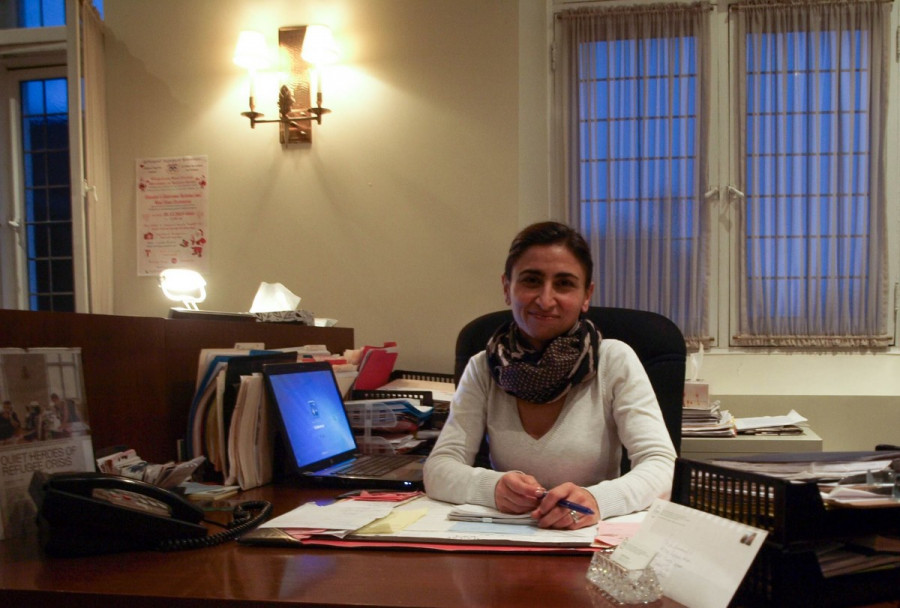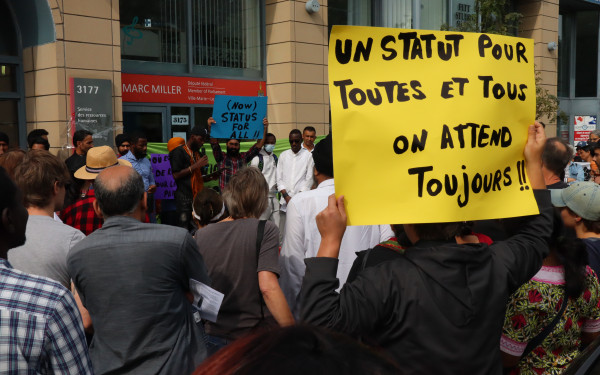Escape From Syria
Local Organization Brings Syrian Refugees to Quebec
On an uncharacteristically humid and balmy Friday afternoon in November, I make my way through the sleepy streets of Outremont, arriving at the entrance of an old grey Armenian church.
Through the large wooden doors, I climb up the stairs to the second floor to meet the director of Hay Doun, a local organization that’s been working tirelessly over the last few years to bring Syrians to Canada.
In the waiting room, I meet a young woman named Rena and her father Hovig.
I muster the courage to say a few words in Armenian and we begin to chat casually. Rena and her father are both Syrian refugees who fled their native city of Aleppo and have been in Montreal for only a few weeks.
“We saw everything,” Rena tells me, as she recounts her family’s frightening journey from Syria to neighbouring Lebanon. She describes how they took a treacherous taxi ride from Aleppo to Beirut, where they found safety in an overcrowded district.
“Beirut is filled with garbage,” she says, discussing Lebanon’s state of dysfunction as the shadow of the Syrian conflict spills over the border.
At the beginning of the war, Rena’s grandfather was taken captive by a rebel group associated with Daesh—the Arabic word for Islamic State—and witnessed many atrocities. When he was released from captivity, he suffered a mental breakdown and exhibited symptoms similar to those suffering from Alzheimer’s. He died five months later while Rena and her family sought refuge in Beirut—they never got to say a proper goodbye. This is the sort of struggle that thousands of refugees are contending with every day, and that many are desperately trying to escape.
“They just want a second chance in Canada,” says Narod Odabasiyan, the director of Hay Doun.
“They just want a second chance in Canada.” — Narod Odabasiyan, director of Hay Doun
“They’re not terrorists, they’re families who have been through turmoil.” A poignant statement, considering that the perception of refugees fleeing the war has been marred by the terror attacks in Paris on Nov. 13.
Odabasiyan says this all started six years ago when Hay Doun began facilitating the sponsorship of families fleeing the war in Iraq. When the Syrian conflict erupted, they saw an overwhelming volume of Syrians trying to take refuge in Canada and have been working non-stop to help them find a home here. As of September, they have helped over 600 families caught up in the conflict, funded by private donations.
During my visit, the office was bustling with activity, the phone ringing constantly, people coming and going, waiting to see if their loved ones were approved for sponsorship.
Hay Doun also goes beyond financial support, by helping newly arrived Syrians integrate into Montreal society. This includes helping them with French courses, filling out government documents and even providing essentials like winter coats. From the moment Syrians arrive at the airport, Hay Doun “coordinates and bridges services” aimed at providing help and care to vulnerable community members. Although Hay Doun was founded by the Armenian community and is continuously supported by them, their mandate is to help all those in need.
I’m introduced to a bright young woman named Nayiri, born and raised in Aleppo, who’s been in Montreal for almost a year now.
“I still have lots of family and friends in Syria,” she says soberly as we talk about the conflict. “The first bomb went off in our building.” The explosion she is talking about severely injured Nayiri’s father, a doctor who was coming home from his shift at the hospital. She tells me that he is still suffering from this injury, but is now being treated here.
She adds how they fled to Lebanon, where they heard about Hay Doun and applied for sponsorship. On this afternoon, Nayiri was just passing by the office to say a quick hello, demonstrating the organization’s ability to provide a real sense of community for new arrivals. This is especially important for those having difficulty adjusting to life in Canada, with everything from the language barrier to the weather. Nayiri is unphased.
“I prefer the cold winter,” she says, “compared to the rainy summers in Aleppo.”




1_600_375_90_s_c1.jpg)
_600_375_90_s_c1.jpg)

_600_375_90_s_c1.JPG)